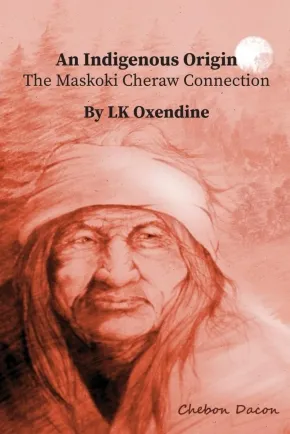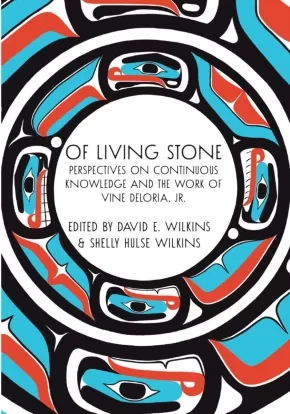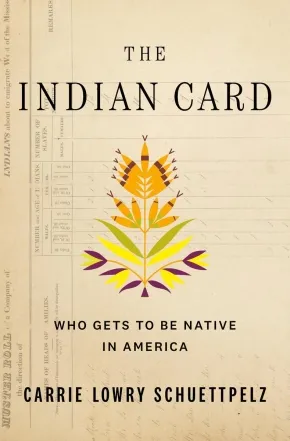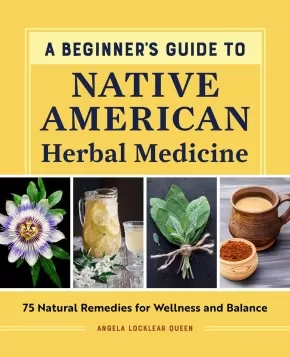Lumbee
Synopsis:
An Indigenous Origin – The Maskoki Cheraw Connection unveils a deeply researched and long-overlooked history of the Lumbee Tribe’s ancestral connection to the Cheraw people. Drawing on fourteen years of meticulous research, LK Oxendine uncovers historical records, maps, treaties, and cultural narratives that restore a suppressed identity erased by centuries of denial, displacement, and political marginalization.
From the ancient Maskoki territories to the arrival of Spanish, French, and British forces, this compelling account traces the Lumbee Cheraw’s journey through survival, cultural preservation, and the ongoing struggle for recognition. Oxendine’s work honors the voices of ancestors, the strength of matrilineal societies, and the unbreakable ties between people and land.
Part memoir, part ethnographic history, this book invites readers to witness the truth long hidden in archives and oral traditions, truth that affirms an honorable Indigenous heritage and demands acknowledgment in the twenty-first century.
If you are drawn to Indigenous history, identity reclamation, and the untold stories of the American Southeast, An Indigenous Origin – The Maskoki Cheraw Connection is an essential read.
Additional Information
416 pages | 6.00" x 9.00" | Paperback
Synopsis:
Of Living Stone: Perspectives on Continuous Knowledge and the Work of Vine Deloria, Jr. is a collection of new essays on the legacy of Vine Deloria, Jr., one of the most influential thinkers of our time. This insightful collection features more than thirty original pieces, bringing together Tribal leaders, artists, scientists, activists, scholars, legal experts, and humorists. A group of French scholars offers surprising perspectives on Deloria’s continuing global influence. Readers will find thoughtful and creative views on his wide-ranging and world-changing body of work. Some build upon his ideas while others offer important criticisms. In addition to its content, this volume is unique in that it was designed to center the traditional exercise of continuous knowledge whereby information is routinely shared, considered, and pragmatically adapted as it flows between generations. In this way, people, ideas and traditions remain alive and relevant—not set in stone —as the past is honored by those living in the present as they prepare for the future.
The book includes contributions from a number of remarkable individuals, including:
- Climate expert Margaret Redsteer (Crow)
- Melanie Yazzie (Diné), host of The Red Power Hour podcast
- Cheryl Crazy Bull (Sicangu Lakota), president of the American Indian College Fund
- Activists Faith Spotted Eagle (Yankton Dakota) and Lauren Schad (Cheyenne River Lakota)
- Writer and producer Migizi Pensoneau (Ponca/Ojibwe)
- Environmental scientists Kyle Whyte (Citizen Potawatomi) and Ryan Emanuel (Lumbee)
- Experts on Tribal Governance Deron Marquez (Yuhaaviatam of San Manuel), Frank Ettawageshik (Little Traverse Bay), Norbert Hill (Oneida), Megan Hill (Oneida), and Marty Case.
- Artists Cannupa Hanska Luger (MHA-Three Affiliated Tribes) and James Johnson (Tlingit)
- Legal Scholars Sarah Deer (Muscogee), Rebecca Tsosie (Yaqui descent), and Gabe Galanda (Round Valley)
- Archaeologist Paulette Steeves (Cree-Metis)
- Scholars of Indigenous Traditions Noenoe Silva (Kānaka Maoli), Natalie Avalos (Chicana of Mexican Indigenous descent), Tom Holm (Cherokee), and Greg Cajete (Tewa-Santa Clara Pueblo).
Time magazine named Vine Deloria, Jr. as one of the greatest thinkers of the twentieth century, and his research, writings, and teachings on history, law, religion, and science continue to influence generations of Indigenous peoples and their allies across the world.
Reviews
“For me as a young person in the 1980s and 1990s, Vine was the only stranger I thought of as family. He was funny and heart-stabbingly blunt. So we have Vine Deloria to thank for revitalizing Indigenous knowledge gathering. Inspired by Vine’s life work, Anishinaabe people now understand that we learn by listening (bzindamowin), observing (gnawaaminjigewin), and ceremony (manidookewin). We also know it’s important to have a LOT of fun (miiziiwapine). Of Living Stone is both a somber memorial and a raucous celebration of Vine’s work.”—Matthew Fletcher (Grand Traverse Band of Ottawa and Chippewa Indians), University of Michigan, and author of The Ghost Road
Additional Information
528 pages | 6.00" x 9.00" | Paperback
Synopsis:
A groundbreaking and deeply personal exploration of Tribal enrollment, and what it means to be Native American in the United States
Who is Indian enough?
To be Native American is to live in a world of contradictions. At the same time that the number of people in the US who claim Native identity has exploded—increasing 85 percent in just ten years—the number of people formally enrolled in Tribes has not. While the federal government recognizes Tribal sovereignty, being a member of a Tribe requires navigating blood quantum laws and rolls that the federal government created with the intention of wiping out Native people altogether. Over two million Native people are tribally enrolled, yet there are Native people who will never be. Native people who, for a variety of reasons ranging from displacement to disconnection, cannot be card-carrying members of their Tribe.
In The Indian Card, Carrie Lowry Schuettpelz grapples with these contradictions. Through in-depth interviews, she shares the stories of people caught in the mire of identity-formation, trying to define themselves outside of bureaucratic processes. With archival research, she pieces together the history of blood quantum and tribal rolls and federal government intrusion on Native identity-making. Reckoning with her own identity—the story of her enrollment and the enrollment of her children—she investigates the cultural, racial, and political dynamics of today’s Tribal identity policing. With this intimate perspective of the ongoing fight for Native sovereignty, The Indian Card sheds light on what it looks like to find a deeper sense of belonging.
Reviews
“The Indian Card is a candid, unflinching look at the sometimes subtle, sometimes ruthless ways federal policies undermine Indigenous culture and society. Carrie Schuettpelz understands first-hand how official tribal membership rations not only access to benefits such as healthcare and housing stipends, but also an ineffable sense of belonging. Her thorough excavation of the painful history that gave rise to rigid enrollment policies is a courageous gift to our understanding of contemporary Native life.”– The Whiting Foundation Jury's Note
"The Indian Card is all at once an intimate portrait, a sweeping history and a thoughtful examination of tribal identity, Native sovereignty and the quest for belonging."—WBUR
"Carrie’s book is so dang good you need to get two copies: one for you and then the other for a friend. Schuettpelz, with so much research and interviews, shares the stories of people caught in the mire of identity-formation with such ease. The voice is pitch perfect, there is not one wrong word and the content is written with so much grace and elegance and honesty you can’t help but finish Schuettpelz’s work knowing it will live on for as long as it takes to unravel the many, many contradictions surrounding what it means to Native American today." - Morgan Talty, author of Fire Exit
"A well researched book for readers who are curious or confused about complex kinship relationships in Native America. Armed with personal experience, interviews, and scholarly data, Carrie Lowry Schuettpelz tackles the political nature of Indigenous identity with clarity and concision."—Deborah Taffa, author of Whiskey Tender
"Illuminating...An innovative exploration of a thorny issue." —Publishers Weekly, starred review
"A clear and frank analysis of the challenges that define Native selfhood." —Kirkus Reviews
Additional Information
304 pages | 6.12" x 9.25" | includes 10-12 charts/figures and captions throughout | Hardcover
Synopsis:
Improve your well-being with Native American herbal medicine
Native American herbal medicine offers a powerful way to connect with the earth and heal naturally—and with this handbook of Native American herbs, you can learn all about herb uses and their restorative effects. Written by an Indigenous herbalist, this guide shows you how to responsibly use traditional plants to treat anxiety, colds, inflammation, and more.
This standout among books about herbs and healing will help you:
- Learn about a time-honored practice—Discover the origins and healing secrets of Native American herbalism, its traditional and modern uses, and how tools like the medicine wheel teach us about our relationship with the natural world.
- Identify the essential herbs—Explore the healing properties of medicinal herbs for wellness, from anise hyssop to yerba santa.
- Make 75 natural remedies—Ease physical and emotional ailments with Native American remedies, like Memory Support Tea, Stress-Induced Headache Tincture, and Antibacterial Healing Herb Liniment.
Tap into traditional wisdom with this Native American herbal medicine book for health and well-being.
Reviews
"A beautiful jumping-off point for anyone who is interested in practical herbalism. Angela organizes the wisdom of Native American herbalism in a way that is accessible for anyone to pick up and fold into their everyday life." —Kathleen Lee, acupuncturist, herbalist, and spiritual business mentor
"Angela is a wise and fierce protector of plant medicine and traditions of healing. Her first book, A Beginner's Guide to Native American Herbal Medicine, is a meaningful, accessible resource for readers who seek to ground themselves in understanding and build an herbal practice of integrity." —Graham Wesley
Additional Information
165 pages | 7.50" x 9.25" | full-colour photographs throughout | Paperback









